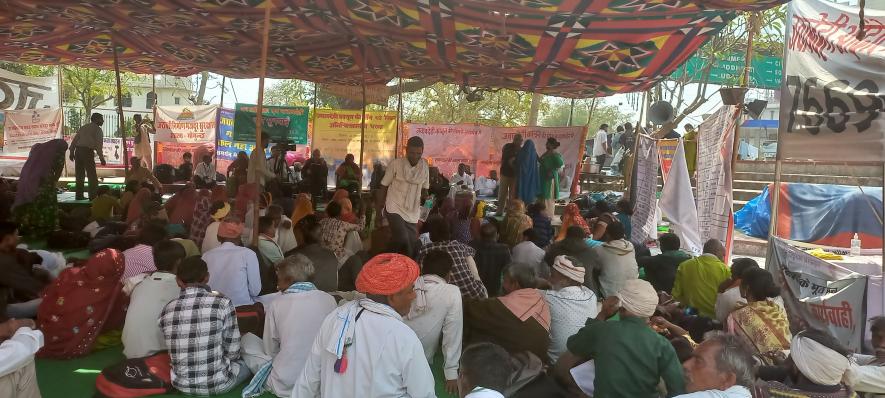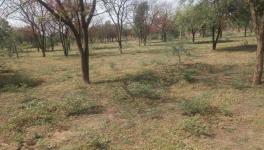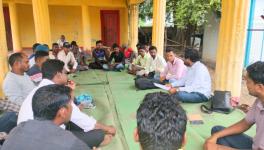Rajasthan Tribal Communities Wait for Pattas Under FRA Indefinitely

Jaipur: Vishram had applied twice for a patta under the Forest Rights Act (FRA), 2006, but without success. A member of the Bhil community in Rajasthan, Vishram, who belongs to Rajasthan’s Talwara village, is always apprehensive about the future.
“We have been staying at the same place for three generations. Though we approached the administration for a patta, we never hear from them. The forest authorities have harassed us in the past and we might lose our houses at any moment,” says Vishram, who came to Jaipur to participate in Jawabdehi Yatra, an indefinite protest at Shaheed Smarak demanding the passage of the Rajasthan Transparency and Social Accountability Bill. The Bill aims to empower citizens by ensuring transparency of information and accountability of public functionaries, among others things.
Under the FRA, titles can be granted to tribal communities or other traditional forest dwellers (OTFDs) who had occupied the land before December 2005. But despite providing documentation, Vishram still has not heard back on his application.
The FRA aims to reverse the historical injustice meted out to tribal communities and OTFDs, ensure their land tenure, livelihood and food security and strengthen the conservation regime of the forests. In 2019, the Supreme Court had directed state governments to review rejections of claims under the FRA.
According to the 2011 Census, Rajasthan has more than 13% tribal population. The FRA is an important legislation which ensures that the rights of tribal communities and OTFDs are protected when it comes to community rights and individual rights. As per the data of the Rajasthan government, it has received a total 99,506 claims out of which 43,326 have been rejected, 400,015 approved and 16,165 are pending.
Tushar Dash, an independent researcher on forest rights, points out that if the public accountability law comes into force, it would catalyze the response of the authorities to forest rights claims. “A large number of claims are pending for years. While there are more than 10,000 FRA potential villages in the state, community forest rights have been recognised only in a few.”
Mohan Lal, from Banswara, had a similar story to narrate as Vishram. He had first applied for a patta in 2008. “There are 20 houses in the stretch where we stay. It is cut off from the developed part of the village. Most of the other families had applied for patta but we never heard back from the authorities. We felt that there was no point in submitting our applications as the authorities don’t pay attention to our rights,” he says showing his documents at the protest site. “The state government should take note of this injustice against us.”
RD Vyas, a member of Rajasthan Adivasi Adhikar Manch, points out that the FRA can be implemented true to its spirit when the forest authorities are sensitised to the need of handing out the rights guaranteed under the Act to people.
“There is a lack of understanding among the authorities in the state on how crucial it is to guarantee the rights—of the community and the individual. There is a lack of coordination among government departments. A timely review of claims is the need of the hour,” says Vyas.
Nakiz and Kantilal, both members of the Bhil community, say that the lack of pattas also means frequent harassment by forest department officials. It is a lost battle for securing their rights as there has been no response to the applications, pending for years, they say. “We are at the mercy of the authorities,” says Kantilal.
More than 350 titles out of the total 1,733 claims have been distributed, according to data collected till October 31, 2021. Activists point out this is a violation of the spirit of the law. “The primary challenge is that the state is not recognising community rights, which are the essence of the FRA. The decisions to hand out titles are quite arbitrary. The forest department needs to have a better understanding of the nuances of the FRA and has to be convinced that it is impossible to save the forests without tribal communities,” says Ramesh Nandwana, convener, Jungle Jamin Jan Andolan.
Ritwika Mitra is an independent journalist.
Get the latest reports & analysis with people's perspective on Protests, movements & deep analytical videos, discussions of the current affairs in your Telegram app. Subscribe to NewsClick's Telegram channel & get Real-Time updates on stories, as they get published on our website.























